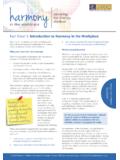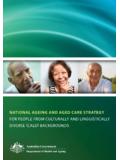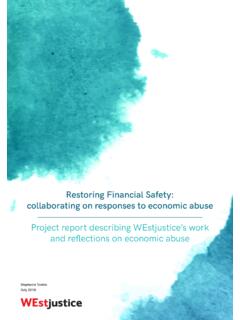Transcription of Community Leadership Advocacy and Skills - FECCA
1 Federati on of Ethnic Communiti es Councils of Australia1 Community LeadershipAdvocacy and SkillsA Resource Kit for Culturally and Linguisti cally Diverse Communiti es in AustraliaCommunity Leadership Advocacy and Skills2 About FECCAFECCA is the nati onal peak body representi ng Australians from culturally and linguisti cally diverse (CALD) provide Advocacy , develop policy and promote issues on behalf of our consti tuency to government and the broader supports multi culturalism, Community harmony, social justi ce and the rejecti on of all forms of discriminati on and s membership comprises state, territory and regional multi cultural and ethnic councils. FECCA has an elected executi ve committ ee and a professional nati onal secretariat implementi ng policies and work programs on behalf of its membership and resource kit has been compiled and published by:FECCAPO Box 344 Curti n ACT 2605(02) 6282 FECCA 2009 This publicati on is not for commercial sale or use and no profi ts are derived from this work.
2 Work sourced from other references has been acknowledged wherever possible. FECCA has made every eff ort to contact copyright holders for permission to reproduce work. If you believe your copyright has not been acknowledged, please contact kit was created to provide general informati on. It does not consti tute legal advice to any person and should not be relied upon as authoritati ve in any parti cular on of Ethnic Communiti es Councils of Australia3 ContentsAbout FECCA 2 Acknowledgements 4 Foreword 5 Introducti on 6 How to use this resource kit 7 Part 1 Advocacy and Leadership 8 What is Advocacy and
3 Leadership ? 8 How is Advocacy undertaken? 10 Where should Advocacy be undertaken? 10 Barriers to eff ecti ve Advocacy 10 An ethical framework for Advocacy 11 The Australian politi cal system 13 Learnings 14 Part 2 Establishing a Community organisati on 15 Group Advocacy 15
4 Organisati onal administrati on 20 Strong organisati ons 22 Learnings 24 Part 3 Tools for Advocacy and Leadership 25 Communicati ng eff ecti vely 25 Promoti ng your message 28 Developing a campaign 33 Meeti ngs 34 Infl uencing people to support your cause 36 Lobbying politi cians 37 Step-by-step process for getti ng your issues heard 40 Gaining support and fundraising 41 Building strategic networks 44 Taking care of yourself
5 45 Keeping your Community together 46 Learnings 46 Part 4 Where to get more informati on 47 Glossary of terms 53 References 54 Community Leadership Advocacy and Skills4 AcknowledgementsA number of organisati ons and authors have produced materials designed to assist people to be eff ecti ve advocates and leaders. FECCA has adapted these materials and this kit would not have been possible without them. In parti cular FECCA acknowledges:Leti ti a Bouloukos, 2002, Be Fearless! A guide to getti ng your voice heard by the Community , your government representati ves and government departments, Ethnic Communiti es Council of Queensland, Department of Health and Community Services, Nati onal Mental Health Branch (CDHCS), 1999, The Kit A guide to the Advocacy we choose to do.
6 A resource kit for consumers of mental health services and family carers, CDHCS, also acknowledges the material adapted from materials produced by Consumer Aff airs Victoria. A list of references is at the end of this on of Ethnic Communiti es Councils of Australia5 As new migrants and humanitarian entrants become established in their Community many will want to take on a Leadership and Advocacy role to bett er represent the interests of their fellow citi advocates are an essenti al part of our democrati c process. Advocates convey Community views to government so that decisions can be made that are in the best interests of communiti es and the nati on as a whole. To ensure that the right policy decisions are made, it is important that Community advocates are both skilled and representati ve of their Community Leadership , Advocacy and Skills Resource Kit such as this is a welcome and much needed guide on how to undertake and manage these acti viti es.
7 It is aimed at people who have had litt le experience in this fi eld and who may also be unfamiliar with our politi cal and social structures. It contains very useful ti ps and informati on on ethical Advocacy , establishing a Community organisati on, communicati ng and lobbying. It explains how to arrange, parti cipate in, and chair meeti ngs eff ecti vely, with practi cal advice on keeping meeti ngs focused and taking minutes of a meeti ng. The Kit also covers the importance of building strategic networks. Networking, negoti ati on and collaborati on within and between communiti es is criti cal to building Community capacity and promoti ng Community commend the Federati on of Ethnic Communiti es Councils of Australia and the other organisati ons involved in producing the Community Leadership , Advocacy and Skills Resource Kit.
8 I am confi dent this resource will be helpful to all Australians with an interest in Community Leadership and FERGUSON, MPParliamentary Secretary for Multi cultural Aff airs and Sett lement ServicesForewordCommunity Leadership Advocacy and Skills6 IntroductionAustralians come from over 200 diff erent ancestries and speak more than 300 languages. Immigrati on has been a constant in Australia since European sett like sett lement, social inclusion, employment, educati on, English language training, health, housing and discriminati on can be very diffi cult for many migrant and refugee communiti es. These issues can lead to acute social principles of multi cultural policy in Australia include access and equity, Community harmony and the right to live a life free from racism and discriminati on. These are all underpinned by the idea of social justi ce and more recently by the emerging fi eld of social inclusion.
9 Social justi ce has three basic principles:All people must be guaranteed equal legal and politi cal rights as well as the capacity to exercise those rights All people should be able to parti cipate fully in society and have input into decisions which aff ect their livesEconomic and social inequality should be reduced so that people who experience disadvantage can parti cipate in social disadvantage that migrant and refugee communiti es can face means it is very important they have strong and eff ecti ve advocates and leaders. Strong advocates and leaders can help those who make decisions about policies and services bett er understand the needs of CALD communiti es. This can help to bring about positi ve change and social justi and leaders can also ensure that their communiti es are strong and can lead to opportuniti es for self empowerment and personal fulfi lment.
10 It can be personally very rewarding. Advocacy can also be challenging and diffi cult. Someti mes you will succeed in what you are trying to do. Someti mes you will not. Advocates and leaders need as much informati on and support as are many ways to make your Advocacy and Leadership acti viti es more eff ecti ve. For example: increasing your knowledge about issues, clarifying your atti tudes and values and learning new Skills and kit aims to provide you with informati on, Skills and strategies to make your Advocacy acti viti es as eff ecti ve as on of Ethnic Communiti es Councils of Australia7 How to use this resource kitThis resource kit is designed to help advocates become leaders, and for leaders to think more fully about how to undertake it is primarily for new and emerging communiti es, or those forming new groups, it contains useful advice, ti ps and informati on, even for the most experienced Community representati encourage you to get a feel for the enti re kit, before you work through the diff erent secti ons.








